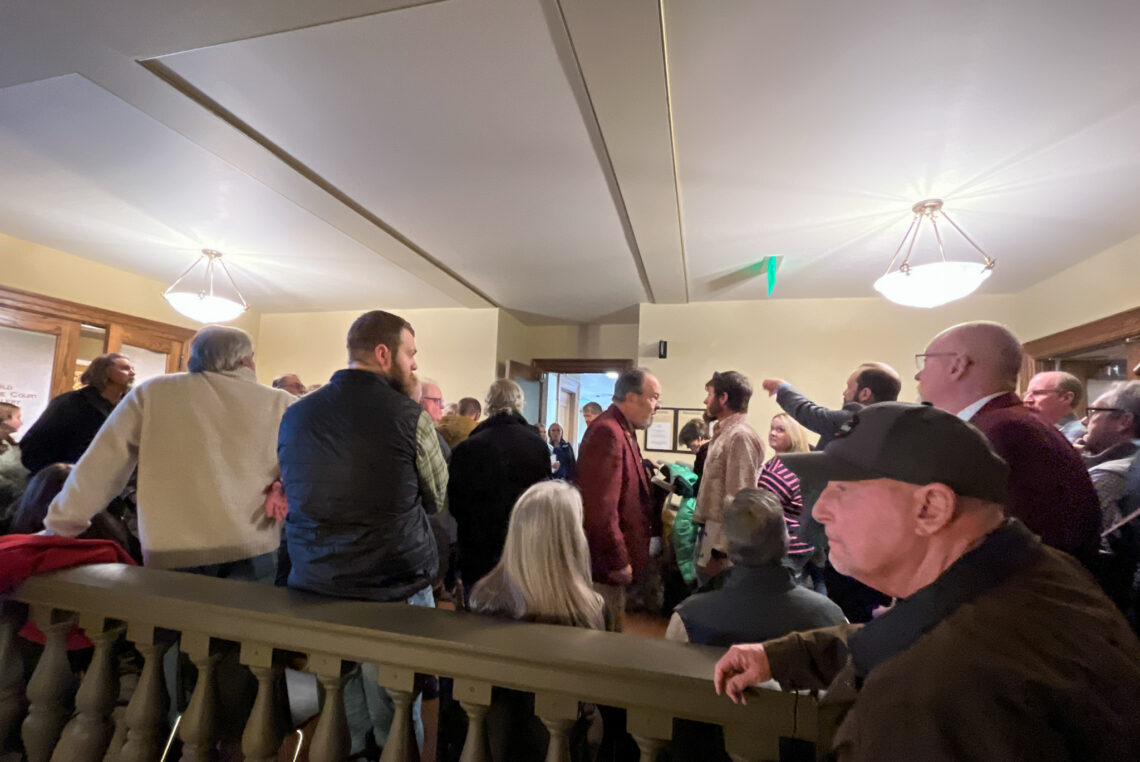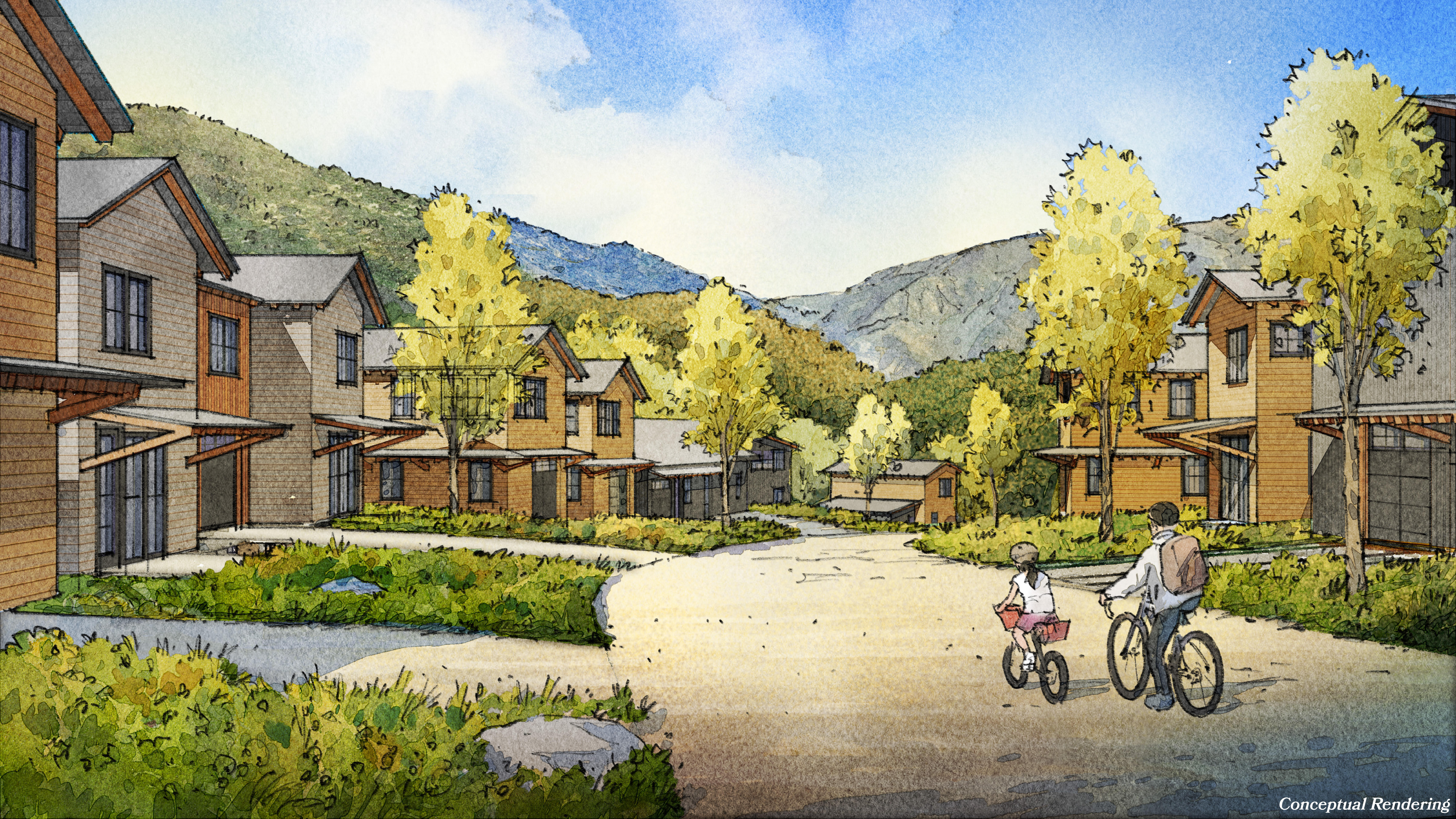Public comments include recommendations for amendments, concerns for rural services and possible eminent domain of Jack Creek Road
By Jen Clancey STAFF WRITER
Local issues like Jack Creek Road access, school district costs and medical services were the main topics of conversations in a Montana Senate Taxation Committee hearing Wednesday morning. Madison Valley and Big Sky residents traveled to Helena on Feb. 12 for a committee hearing on Senate Bill 260, a bill that would define parameters of special district withdrawal in Montana.
Dozens of people in the hallway outside of the committee room peered at the meeting’s livestream as residents, local government officials, teachers and administrators gave public comments on a local withdrawal issue that’s led to lawsuits and impassioned Madison County Commission hearings. SB 260 would allow for changes in service district boundaries if homeowners can’t access services due to geographical barriers, legal access to roads, or lack of county-maintained routes. With a qualified petition, homeowners within a withdrawal area would then elect to leave one service district to enter a different one.
The bill addresses Big Sky residents’ unsuccessful attempts to withdraw from the Madison Valley Hospital District, in which a portion of Big Sky resides and supports through property taxes. MVHD’s medical center is located in Ennis. Big Sky residents who wish to access these services and travel the shortest distance must travel on Jack Creek Road, a private route that requires a pass. The closest public route is through the Gallatin Canyon and onto Montana Highway 84, about an 85-mile route.
While most conversations have discussed hospital district concerns, proponents of the bill emphasized the need for change in the relationship between Ennis and Big Sky school districts too.
Sen. Greg Hertz (R-Polson), the primary sponsor of the bill, stepped out of his role as Senate Taxation Committee chair to present SB 260 and discuss what he learned from serving on the Governor’s Property Tax Task Force.
“ What we found out was in counties across the state, some school districts have created district boundaries to grab a certain asset that might be high taxable value to help out their school district,” Hertz said. According to Hertz, a $500,000 Ennis home comes with about $70 a year in taxes to the Ennis School District.
“That was the information I got. When I woke up at 4 a.m. this morning thinking about how to help both these communities solve a problem, I’m like … I need to go look at that,” Hertz said. He said he learned from a Madison County cadastral that a $1.3 million Ennis home pays about $176 in annual taxes to Ennis schools.
“It’s important to note that this year, the Ennis School District has the lowest local tax burden for any school district in the entire state of Montana,” said John Zirkle, a Big Sky Resort Area District board member and Big Sky School District teacher.
Jackie Haines, the director of economic and strategic development for BSRAD, noted in her public testimony that in 2024, $3 million in Big Sky resident tax dollars went to Ennis schools, and in return, the Big Sky School District received about $70,000 from Ennis schools to educate 26 children who live in the Madison County portion of Big Sky.
The superintendent of the Ennis School District, Jared Moretti, was glad to hear concerns from both sides at the Senate hearing. Formerly working in Cody, Wyoming, Moretti has lived in Ennis and worked as a school administrator for one year. He hopes that both school districts can meet to find a mutually beneficial solution, separate from discussions of the hospital district boundaries.
“Even though there are some similar concerns, I really do see this as kind of almost two separate issues,” Moretti said. “I would like us to sit down and see if there is a way that we could work through this without having to go up to Helena.”
He believes it’s important to make sure tax dollars are supporting both Ennis schools and the Madison County students that attend Big Sky schools.
In the hearing, Moretti spoke about the need for $3 million in repairs in Ennis schools. The projects include roofing, boiler and water and sewer repair. He expressed concern over the difficulties in completing the projects without ongoing taxpayer support. Bonds to improve facilities have failed in the past, including two recent bonds in 2022 to help fund facility upgrades.
Big Sky School District Superintendent Dustin Shipman expressed the need for parents to be involved in their kids’ school districts, through voting on Big Sky school board members and having a say in their children’s education.
“Montana school districts pride themselves on local control and the basic fundamental of local control isn’t available to these residents,” Shipman said.
Hospital budgets, bill language and eminent domain discussed
A gap in hospital revenues became a focus for SB 260 proponents. According to documents shared by BSRAD, the Madison Valley Hospital District budgeted for about $2.1 million to be placed in cash reserves for both fiscal year 2022 and 2023.
BSRAD Executive Director Daniel Bierschwale noted that this revenue is not mirrored at the Bozeman Health Big Sky Medical Center. “Our hospital runs at a $1 million deficit,” Bierschwale said. According to Haines, Big Sky residents send $3 million each year to MVHD.
Allen Rohrback, CEO of the Madison Valley Medical Center, noted that MVHD is interested in continuing services for Big Sky residents by expanding to a physical center in Big Sky.
“We believe that the best benefit for Big Sky is to have two active hospitals in the community,” Rohrback said. Several opponents of the bill, including health care workers and residents, expressed concern about SB 260’s effects on rural health care services in their community and others in the state.
Lance Melton, the chief executive officer of a nonprofit organization that works to strengthen school districts in the state called the Montana School Boards Association, expressed concern with language in the bill that could have consequences beyond Big Sky and Ennis conflicts.
He noted during the questioning portion of the hearing that a section of the bill would allow corporations to be considered as qualified electors and initiate petitions. As an opponent of the bill, he emphasized working more on the bill’s language to filter out concerns about geographical barriers, bonding, and lending power to property owners that do not reside on land in a withdrawal area.
Bierschwale said that next steps include revising the aforementioned section. “ Petitioners who own property in Big Sky, or taxpayers in Big Sky that have those under an LLC, in the original bill text would have been able to sign the petition. But in the revised amendments, we’re going to keep that strictly with just taxpayers that are also voters that reside in Big Sky,” Bierschwale said in a phone call with EBS.
Legislators also had questions about Jack Creek Road, which Madison County Commissioner Bill Todd answered.
“Right now it is privately owned and there is an element of access for emergency services. One of the things that we are going to explore is the eminent domain of that road,” Todd said. “I could say that any remedy and solution is on the table as far as Madison County is concerned, and especially any remedy that would improve access to workforce housing, for public safety purposes, for educational needs or for just tourism which is the life blood of our counties.”
“That’s literally the first time I have ever heard Madison County is exploring eminent domain for Jack Creek Road, and what that means, I have no idea,” Bierschwale told EBS.
“It would be helpful, if that’s a conversation going on, for the community to be aware of that,” Bierschwale added.
In a written comment to EBS, Bill Todd described further what he introduced in the meeting about eminent domain. “Madison County is actively exploring the seizure of Jack Creek Road via eminent domain. Public facing discussions will begin during our Commission’s work session on Monday, February 24th, which begins at 10 a.m.,” Todd wrote in an email.
Overall, Bierschwale noted that the hearing was a good showing for both sides of the debate. “I felt like both communities were very respectful,” Bierschwale said.
Supporters and opponents can expect a vote on SB 260’s movement to the Senate floor sometime next week. The nearly three-hour hearing left lawmakers and residents with lots to think about as southwest Montana residents filed into carpools from the capitol, including an Ennis Mustangs bus.













